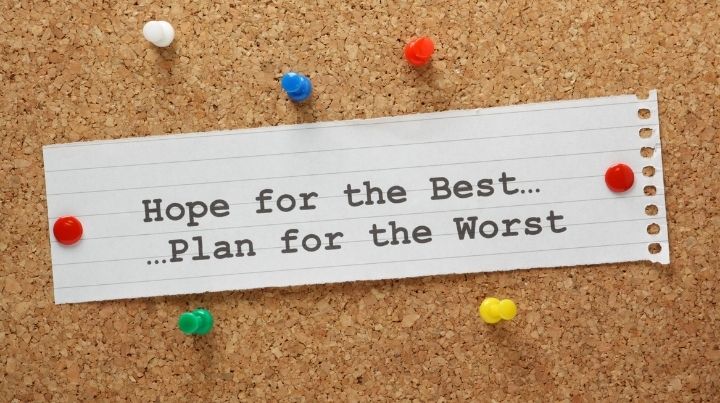5 Situational Awareness Tips to Help You Become More Alert

Being more alert to your surroundings is not difficult with these simple situational awareness tips. It can also be a fun and reassuring process that leaves you more confident and ready to deal with all of life’s challenges. Read through the five situational awareness tips below and give them some thought. When you’re ready, start putting the steps into practice.
The sooner you start, the sooner you’ll lead a more safe, secure, and prepared life.
Situational Awareness Tips: “What If?”
As you go about your day, look at things and people around you and ask, “What if?”
What if…
…my child becomes ill, and the car won’t start?
…I find an older adult lost and unable to remember where he or she is?
…a vehicle crosses the median headed straight towards me?
…I find myself faced with a significant unexpected expense?
… etc., etc., etc.
Keep thinking up new scenarios, and you’ll keep improving.
You can come up with mountains of possibilities of things that could go wrong. When you’re stumped, turn to the news media, and they’ll have no shortage of new “what if” situations. Whether it’s the Internet, on television, or elsewhere, there is an endless number of possible scenarios out there. These stories are often very unfortunate events for the people impacted by them. However, you can turn someone else’s sad circumstance into a learning experience for you and your family.
The second step to the “What If?” process is to think through your response to your question. By thinking through a potential response, you learn to speed up your OODA Loop’s decision-making process. Not only will you improve your decision-making, but you’ll also learn to make more rapid, accurate, and efficient decisions.
Once you’ve thought through your potential responses, you next need to critique those reactions. Make mental notes of the points that you think are bad and the points that are good. Then reevaluate your actions, replacing the bad points with new thoughts and ideas.
As you think through all of this, you will begin formulating innate, quick-to-put-in-action responses to potential situations. These responses will continually get better, and you’ll execute them more quickly. This process is the mental pre-planning that leads to improved situational awareness.
Situational Awareness Tips: Story Time
This just might be the most useful of all the situational awareness tips.
Observe people around you and create stories about them. When you’re making up stories, incorporate what they’re wearing, doing, carrying, etc. As you do this, you will teach yourself to notice each person’s small details.
By noticing the small details, you’ll learn to be more observant and read people better. When you’re more observant, you’ll see if something is out of place or doesn’t seem right. You will also improve your ability to pick up on a person’s non-verbal communication. The book Left of Bang is one of the best around learning this specific skill.
Once you’ve become good at creating and telling a story about one person, add more people to the mix. This time, include information about how they relate to one another, what is happening in their lives, and their motivations within your story.
The more details you notice, the more dynamic your story, the more this will prepare you to help yourself or see someone in need.
Situational Awareness Tips: Make a Plan
Now that you’ve begun asking yourself, “What if?” and creating stories about people, it’s time to take action. Taking action means formulating plans for the situations and stories you’re running through in your mind. It’s a really good practice to write them down.
Even if it is in simple bullet-point format, writing them down helps you refine your plan even more. Sometimes writing a plan down provides a visual cue if there is a weakness. It also enables you to commit your plan to memory.
Once you have a written or mental plan, share it with your family and friends. Rather than telling them what you’re going to do, pose the scenario to them. Let them say what they would do. They may provide you with an idea you never thought of. Also, by asking someone for their thoughts rather than pushing yours on them, you get their buy-in.
Getting their buy-in helps them become active and willing participants and can help you convince them to become more prepared. When they become active participants, not only are they helping you sort out your plan, but they are increasing their situational awareness, too. See, you have barely started, and you’re already helping others! That’s awesome!
So, you have your plans, you’ve included others, and you think you’re just about there. And congratulations, you are. You’re on the road to improved situational awareness. Now, it’s time to fine-tune what you’ve done.
Situational Awareness Tips: Fine Tuning
Fine-tuning your situational awareness is accomplished in a variety of ways. One way is to practice your plans. Another way is to get training in areas that you may be weak.
If you have a home fire plan, go over it with your family and run a fire drill. Remember one thing when practicing your plans and training; crawl, walk, run. The first time you try the plan, choreograph it with everyone and walk through it. Ask questions about the plan, so those participating have to think and provide feedback. While they do, others will learn, too.
Next, try the plan at a little faster speed, with less interaction to see how everyone is doing. As you pick up the pace, expect there to be some mistakes. That’s fine because everyone is learning and working to improve.
Finally, run through it at speed. Make it fun. See who can beat their previous time. If they do, praise them and then reward yourselves with some family fun.
Situational Awareness Tips: Training
Remember, this should be a learning experience and something fun. If someone gets an answer wrong or does something incorrectly, you should provide positive reinforcement so they stay interested and engaged. Keep them motivated and excited. When you do, you and those around you will find you all have improved situational awareness.
As you go over all of this and think it through, you may find that you yourself lack experience or ability in some areas. If you do, consider seeking training. Training is an excellent way to close the gaps in areas that are lacking. Training doesn’t have to be costly. If you want to learn first aid, find a Red Cross or other inexpensive course. If you’re on a tight budget, search YouTube or any number of websites on your topic. Learning skills is an essential part of prepping. Once you have the information and understand what you’re doing, teach it to others. When you teach skills to others, you not only help them, but you help them help you, should you be the person in need.
The Bottom Line on Situational Awareness Tips
Now that you’ve run through all your possibilities and your drills, start at the beginning again. Another essential situational awareness tip is repetition. Think about other possible situations. Work on new solutions to old problems.
Take a second look at your plans. See where you can improve or add more options. See how far you can advance. As you do, you and everyone involved will have learned from these situational awareness tips, enhanced their skills, and will enjoy a more safe, secure, and prepared life.
Stay safe,

Don't Miss Out!
Join the thousands of people who rely on Mind4Survival preparedness advice by subscribing to our FREE newsletter.
- Practical preparedness information
- Zero Spam
- < 0.25% of people unsubscribe




Join Mind4Survival!
Stay informed by joining the Mind4Survival! 100% Secure! 0% Spam!
Follow Us!
Affiliate Disclosure
Mind4Survival is a free, reader-supported information resource. If you make a purchase through our link, we may, at no cost to you, receive an affiliate commission.


Great post Brian! I tend to think of it in a diff way ( but ultimately the same I guess lol) As a woman always go with your gut!!!!
This applies more as a former rape counselor… something happens once “ could be just one of those things “ . Like passing the same person on the street, now notice the same person twice. Could be coincidence or unexplained. If a similar thing happens a 3 time… not an accident, not coincidence consider this may be on purpose. That’s when you really need to step up your personal awareness… and really follow your gut. Don’t be afraid of being a “ bitch” say something and say it loud.
Just my 2 cents lol
Thanks for the great comment Lauren!
Your challenges maybe frustrating and create anxiety and pain. Pain produces the desire for change that can be alleviated Overcoming Adversity through faith, self-confidence and perseverance.